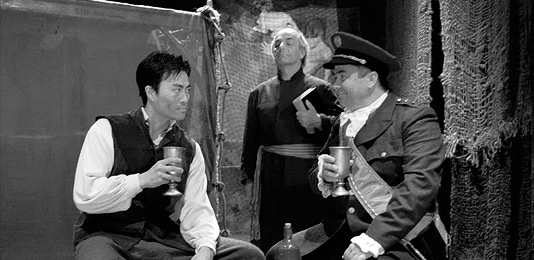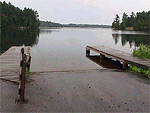


| HOME PLAYS OTHER WRITINGS BIO PHOTO GALLERY CONTACT |
 |
OTHER WRITINGS Short Stories: Nonfiction: Poems: |
Public Landing
A STORY
by Paul Calandrino
THE DAY AFTER HIS father was cremated, Cary Gledhill's only two goals were to dump his father's ashes in the Umpqua River and get out of town. Glen Gledhill had been an avid sport fisherman into his seventies and had requested that his remains be spread upon the river's glabrous currents at a hole, some fifteen miles inland from Reedsport, where he'd reaped the benefits of so many salmon runs. Noting that his son was “not much of an outdoorsman,” Glen included in his will the names of two reputable charter outfits that could likely ferry his son to the correct bend in the river.
At seven that morning, Cary, in a last stubborn attempt to prove his father wrong, hitched his father's 22-foot Suncruiser Tahiti, the Catch ‘M If You Can , to his father's Dodge Dakota, and set out on Highway 38. Just getting the trailer hooked up had been a trial of spectacular proportions, Cary badly bruising the two smallest fingers of his left hand in the process. So as he trundled into the coastal mountains, his mood was already polluted. The urn—cerulean glazed and inlaid with silver rosettes, which his father had brought back from Korea and designated as his final transport to the silty deep of the Umpqua—rested beside Cary on the passenger seat.
His father had never given him enough credit and never respected him at all. Just because Cary from a very early age had chosen not to hunt, fish, repair engines, restore hot rods, play sports, or take woodshop, didn't mean that he couldn't do those things if he'd had any interest in them. As a kid, Cary knew that he'd never measure up to his father—not by his father's measuring stick. After an uncomplaining, workmanlike stint in the 24th Infantry, Glen Gledhill had been a choker setter, a coal miner, a mill mechanic, an auto mechanic, and a construction laborer, all in Coos and Douglas Counties. He had outlived Cary's mother by twenty years and a second wife by five. He was a leathery, wiry, independent, fierce, and selfish man, who had never stopped questioning his son's choices. Cary had read incessantly as a child, which his father found girlish and unproductive. In high school, Cary developed a love of history, which, Glen told him often, would “butter no bread.” When Cary announced that he was leaving the Oregon coast for UCLA and then to pursue a career as an archivist, Glen said something to the effect that he wished Cary's birth had not ruined his mother's “plumbing” and he'd been able to sire more—and better—children. Over the years they had communicated an average of once a year and seen each other about once every five.
The Umpqua was just how Cary remembered it, a lazy tapeworm of a river the luminous green of thriving algae, crawling through the state's defining landscape of alternately forested and stump-stubbled hills. Just past the fourteen-mile marker, as the will had predicted, the public boat landing descended beneath a canopy of firs and maples to the watery banks. Cary guided the truck and boat through the parking lot, where only two other trucks were parked. He made a wide loop away from the river so that the butt end of the boat—Cary's father would have admonished him to use the correct term, “stern”—pointed toward the ramp.
Cary paused then to noodle out how the trailer would respond to the movements of the steering wheel. If he tugged the wheel right, the boat would go right? No, left. The paradigm: the trailer moved in the opposite direction from steering wheel. No problem. Hopefully, he would not have to steer too much, as he had aligned truck and trailer pretty well with the ramp. He eased off the brake and the truck backed up slowly. He was surprised that his father drove an automatic—a singular concession to modern convenience, as far as Cary could tell—but appreciative of the fact now. Looking in the rearview mirror, Cary sensed that the boat was heading too far left, and so turned the steering wheel to the left in order to turn the boat right. What he had not accounted for was the reversing effect of the mirror, and the boat's approach toward the edge was exaggerated. Cary stopped, pulled forward, and tried again. This time he turned around in his seat before heading back. The trailer veered left, Cary compensated. The trailer snaked the other way, Cary jerked the wheel. The trailer jackknifed.
The urn mocked him silently from the seat. Cary knew what his father would be saying now. One of the fundamental skills a man should have was the ability to handle a trailer. Cary was undeterred. He pulled forward and tried again, unaware that another truck had pulled into the lot and was waiting for him to launch. After several more attempts to guide the boat into the water, the left wheels of the trailer hung precariously close to the edge of the concrete ramp. The driver of the other truck, a bearded man in a ball cap and red plaid Pendleton, approached Cary's window.
“Hey,” the man said in neither a friendly nor hostile tone.
“Hello,” Cary said.
“Need some help?”
“No thanks,” Cary said. “I think I can get it.”
“Like to get on the river sometime today,” the man said.
This, though offered in dry jest, was the wrong thing for him to say. It was exactly the kind of thing his father would have said—a belittling remark, intended to shame and humiliate. Cary was in no mood to take guff from a stranger. His father had just died, and he had been commissioned to dispose of the remains, a sacred duty which conferred certain privileges—like taking as much time as he needed to launch a boat.
“Yeah, well you'll just have to wait your turn,” Cary said.
The man's face ripened from a pasty, mountain-folk white to a splotchy, poinsettia red.
“Look, man,” he said, “you're wasting everybody's time.”
“Everybody? It's just you.”
“I'm everybody, Jack.”
“Looks like you have to wait, Joe .”
“Just let me launch your boat and we can both get on to doing some fishing.”
Another thing that Glen Gledhill had done to humiliate Cary during his childhood was to snatch away some task that Cary was not performing to his standards. If Cary were sweeping the driveway or painting a fence or replacing the rubber drive belt on the vacuum cleaner, Glen would find some fault with the execution, grab the broom or brush or belt out of Cary's hands and finish the job himself, muttering about his son's incompetence.
“Why don't you just go to hell and leave me alone?” Cary said.
Before the vapor had finished rising from Cary's lips, the man had opened the door, grabbed him by the coat, and dragged him out of the truck. A jolt of pain shot through Cary's spine as it slammed against the fender of the man's own idling truck.
“Listen, fuckwad. You stay here while I get your boat in the water.” The man stomped to the Dakota, got in, and pulled forward.
Cary realized that he was crying. Stupid, stupid, he thought. Stupid for being unable to launch a boat. Stupid for allowing himself to be manhandled. As his father's boat slid smoothly down the ramp, Cary imagined the stranger and his father smirking at him. You can have him, Cary thought, and climbed into the cab of the stranger's truck amidst the fishing detritus—scale-encrusted rags, spools of monofilament, an open tackle box. He was trying to figure out the pattern of the stick shift when he noticed that in the box lay a revolver, its nose half-buried in a pile of galvanized sinkers. It was the kind of weather-worn, ugly gun that men like his father and the stranger stuck into tackle boxes and junk drawers, as if no more hazardous than a cigarette lighter. Disgusted and trembling, he took the gun and hopped out of the truck.
The stranger was tying the boat to a cleat when Cary shot the pistol into the air. The man shouted gutturally and crouched.
“What the fuck are you doing?” the man yelled.
Cary aimed the gun at the man. “Get away from my boat!”
The main raised his hands and walked up the ramp. “You goddamned fucking psycho! That's my gun!”
“No, you psycho!” Cary said, humiliated immediately by the bollixed language. He sounded like a flustered kid screaming at the playground bullies who had just pushed him to the sand. “My father is in that truck!”
The man, still approaching, said, “What the fuck is wrong with you?”
Cary fired into the air, and the man stopped. Cary then aimed at the man's tire. He didn't want to hurt or kill the man, but he did want to shoot something. He closed his eyes and pulled the trigger. Almost coincident with the report from the gun, were a cartoonish twanging noise—a sound effects version of a ricochet—and throaty screams. Cary opened his eyes to see the man on the ground, blood burbling between the fingers clutching his knee.
Stuffing the gun into the pocket of his jacket, Cary rushed to the cab of the Dakota, grabbed his father's remains, and ran to the boat. In a blur of adrenalin, he managed to untie the boat, start the motor, and navigate to the center of the river. He cut the motor and drifted.
The braided currents of the Umpqua were swifter and more menacing than they seemed from the shore. The man's screams receded quickly behind him, until all he could hear was the wind in his ears and the rippling of water at the hull. He heaved the urn overboard.
“Go to hell,” he said.
The urn bobbed in the water next to the boat. Air was sealed inside the vessel—the lid having been secured with clear packing tape—and it did not sink. Cary took the gun from his pocket, aimed, and shot. A little stalagmite of river water rose and fell. Cupping the butt of the handle in his left palm, he fired again, again, and once again. On the last pull there was no blast, just the pathetic click of the hammer. Cary heard the cackling of shore birds, which sounded for all the world like his father's laughter.
Cary threw the gun at the urn. The weapon sank beneath a fizz of bubbles. He grabbed a long-handled gaff hook from the floor of the boat and swatted at the urn, but it had drifted out of reach. So he started the motor and steered for his father. As the blue and silver bauble neared the left side of the boat—“port,” he remembered—Cary gave a mighty swat of the gaff hook and plunged headlong into the drink.
When he came to the surface, he saw the boat cruising toward the far north bank. When he was nine, his father had chucked him into Ten Mile Lake. Cary had flailed and gulped water and barely heard his father yelling, “It ain’t that hard, son. Just put one hand in front of the other and pull!”
The urn bobbed before him and he grabbed it with both hands. It was just buoyant enough to keep him afloat. He caught his breath and kicked for shore.
"Public Landing" first appeared in Contrary Magazine, Spring 2004, under P.M. Calandrino.